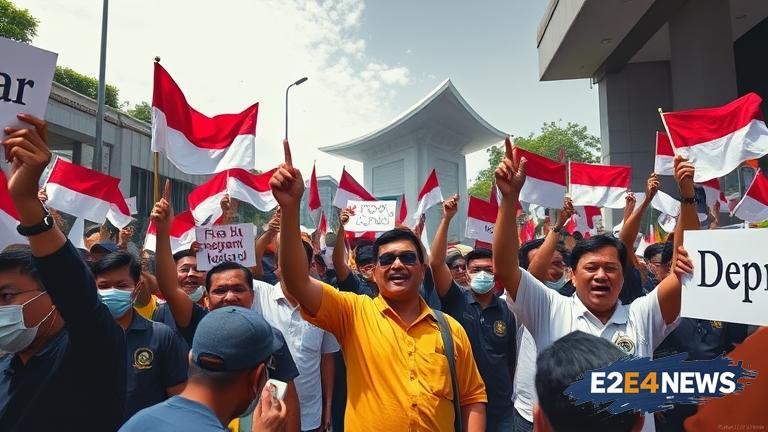Protests have broken out in Jakarta, the capital city of Indonesia, as thousands of demonstrators gathered to express their discontent over the excessive salaries of lawmakers. The protests, which began on a peaceful note, turned violent as some demonstrators clashed with police. The protesters, comprising students, workers, and activists, were demanding that the government take immediate action to address the issue of lawmakers’ salaries, which they deemed to be excessively high. The protesters argued that the salaries were not only a burden on the taxpayer but also a symbol of the country’s corrupt and elitist political system. The demonstrations were sparked by a recent report that revealed the salaries of Indonesian lawmakers to be among the highest in the world. According to the report, Indonesian lawmakers earn an average monthly salary of around $12,000, which is significantly higher than the average monthly salary of a worker in Indonesia. The protesters were also demanding that the government implement reforms to make the political system more transparent and accountable. They argued that the current system was plagued by corruption and cronyism, and that the high salaries of lawmakers were a major obstacle to reform. The protests were organized by a coalition of student groups, labor unions, and activist organizations, who had been planning the demonstrations for weeks. The protesters used social media to mobilize support and coordinate their efforts, with many using the hashtag #TolakGaji to express their opposition to the lawmakers’ salaries. The demonstrations were largely peaceful, with protesters carrying banners and placards and chanting slogans. However, some protesters clashed with police, who used tear gas and water cannons to disperse the crowd. The police also arrested several protesters, who were accused of inciting violence and disrupting public order. The government has responded to the protests by promising to review the salaries of lawmakers and implement reforms to make the political system more transparent. However, the protesters remain skeptical, arguing that the government’s promises are not enough and that concrete action is needed to address the issue. The protests have sparked a wider debate about the role of lawmakers and the need for reform in Indonesia’s political system. Many have argued that the high salaries of lawmakers are a symptom of a deeper problem, namely the country’s corrupt and elitist political culture. Others have argued that the protests are a sign of a growing discontent among Indonesians with the country’s political system and a desire for greater transparency and accountability. The protests have also highlighted the importance of social media in mobilizing support and coordinating protests. The use of hashtags and online platforms has allowed protesters to reach a wider audience and build a sense of community and solidarity. However, the protests have also raised concerns about the potential for violence and instability. The government has warned that it will take firm action against anyone who engages in violent or destructive behavior, and the police have been criticized for their heavy-handed response to the protests. Despite these challenges, the protests have shown that Indonesians are willing to take to the streets to demand change and that the country’s political system is in need of reform. The protests have also highlighted the importance of citizen engagement and participation in the political process. By taking to the streets and demanding change, the protesters have shown that they will no longer accept a political system that is corrupt and unaccountable. The protests have sparked a wider conversation about the need for reform in Indonesia’s political system and the importance of transparency and accountability. As the protests continue, it remains to be seen whether the government will take concrete action to address the issue of lawmakers’ salaries and implement reforms to make the political system more transparent and accountable.
